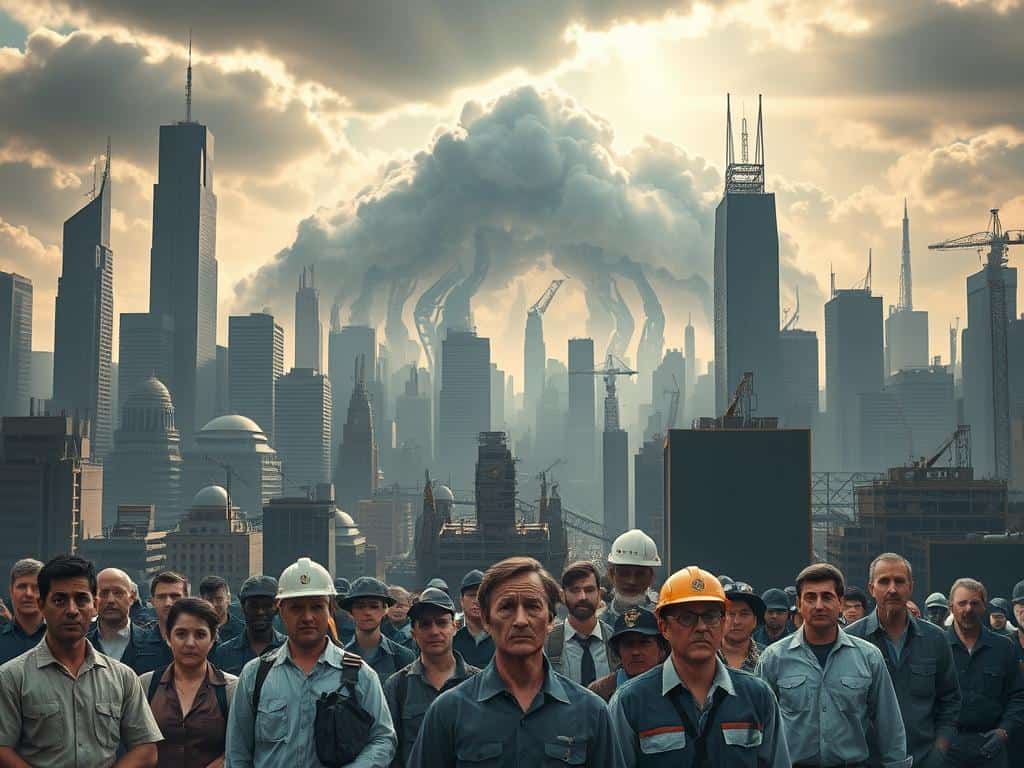The rise of artificial intelligence (AI) is changing the job market in big ways. Shockingly, 37% of companies using AI have replaced workers with this technology. Many industries are facing the fact that 44% of these businesses expect layoffs soon because of AI.
While some think the impact of AI might not be as severe or quick, the truth is clear. AI is changing the workplace, making old jobs disappear and creating new ones. With AI, up to 85 million jobs could be lost worldwide by 2025. It’s important to see both the good and bad sides of AI in our careers and lives.
Key Takeaways
- AI is replacing existing jobs in various sectors, including customer service and administrative roles.
- While jobs are lost, new positions like AI ethics specialists and machine learning engineers are emerging.
- The World Economic Forum predicts a net gain of 12 million jobs from AI by 2025.
- Skills such as critical thinking and emotional intelligence will be in high demand.
- AI could augment human capabilities, allowing workers to tackle more strategic tasks.
- More than 70% of companies plan to adopt AI technologies by 2030, shaping future employment.
The Impact of AI on the Job Market
Artificial intelligence is changing the job market in big ways. It’s affecting jobs in many areas. As I look into job replacement stats, I see a worrying trend but also a chance for change. A big part of jobs could be replaced by AI as companies use new tech.
It’s important for both workers and businesses to understand these changes.
Statistics on Job Replacement
Research shows that about 47% of jobs in the U.S. might be automated in the next 20 years. Job stats reveal that many skills needed for jobs will change by 2030. Workers will need to learn new tech skills to stay in the game.
New jobs like machine learning engineers and AI ethicists are emerging. This shows a move towards more specific roles in the workforce.
Industries Most Affected
Some industries are more at risk from AI. Jobs in customer service, transportation, and manufacturing are often repetitive and can be automated. By looking at these trends, we can help workers choose the right career paths.
It’s clear that industries are changing fast because of AI. Workers need to adapt quickly to keep up.
AI in Business: The Duality of Job Creation and Loss
The rise of AI brings a paradox to employment. Many jobs are changing or disappearing due to automation. Yet, new roles are emerging in response to these changes. It’s key to understand this shift to navigate the future job sectors.
Jobs that AI is Likely to Replace
Several jobs are at risk from AI. Chatbots are taking over customer service roles, making inquiries more efficient. The trucking industry is facing disruption from self-driving vehicles, threatening many drivers’ jobs. AI tools are also changing content creation, posing a challenge to traditional writing jobs.
This highlights the need for adaptability in a world where some jobs may disappear.
Emerging Job Opportunities
Despite the challenges, AI is also creating new job opportunities. Fields like AI ethics and machine learning are growing fast. They need experts to train, manage, and optimize AI systems.
This trend shows that new careers are emerging. Each technological leap brings more innovation, preparing the workforce for these changes.

Benefits of AI Adoption in the Workplace
AI in the workplace brings many benefits. It makes work more efficient and productive. Employees can focus on more important tasks, leading to better job satisfaction.
Experts predict a huge boost in productivity, up to $4.4 trillion. This change is set to transform the corporate world.
Increased Productivity and Efficiency
AI tools save employees a lot of time. Some say they save a whole day each week. This can save companies a lot of money.
Larger businesses can save up to $16.5 million a year. As AI becomes more common, workweeks might get shorter. This shows a balance between technology and human skills.
Improved Decision-Making
AI helps make better decisions. It quickly analyzes lots of data, giving insights for strategic choices. This helps teams avoid risks and find new solutions.
AI boosts human intelligence, helping solve complex problems. More companies are investing in AI, with 92 percent planning to increase their spending.
Conclusion
The job world is changing fast because of AI. AI can do simple tasks, which might worry us about losing jobs. But, history shows that new tech brings new chances. So, we need to learn new skills to keep up.
AI is creating new jobs in AI development and management. For example, Ping An Insurance uses AI to improve customer service. This means some jobs might go away, but new ones will come. It’s a chance for us to grow and learn.
We need to get better at our jobs to work with AI. Many leaders think we’ll need more people who know about AI. This means we have to keep learning to stay ahead. By doing this, we can use AI to our advantage and succeed in our careers.
